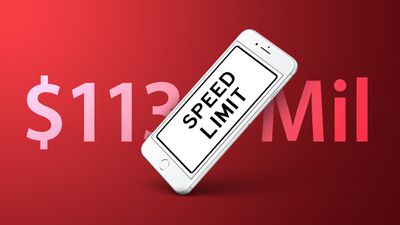Earlier this year, several states launched an investigation into Apple's iPhone "throttling" practices, aiming to determine whether Apple's slowing of older iPhones through power management "violated deceptive trade practice laws."

The investigation has now concluded, and Apple has opted to pay $113 million to settle the matter, reports The Washington Post. Apple has also agreed to be more transparent about similar changes to iOS devices in the future, providing more detail about battery health and power management.
In a statement, Arizona Attorney General Mark Brnovich said that he's committed to preventing tech companies from manipulating consumers.
"Big Tech must stop manipulating consumers and tell them the whole truth about their practices and products. I'm committed to holding these goliath technology companies to account if they conceal the truth from their users."
The investigation involved 34 states and the District of Columbia, and it concerned the 2017 controversy that Apple was embroiled in after quietly adding a power management feature to iPhones in iOS 10.2.1.
Apple's feature was meant to eliminate unexpected shutdowns that older iPhones were experiencing due to exhausted batteries, but it did so through throttling the maximum performance of devices with chemically aged batteries.
Apple did not disclose the throttling when releasing the updates, and customers were outraged when it was discovered that iPhone performance was being downgraded. While Apple said that it implemented the feature to make sure iPhones lasted as long as possible even as the battery began to fail, customers and regulators saw it as evidence of planned obsolescence.
After the throttling was discovered, Apple apologized and launched a battery replacement program that saw the company offering batteries for older devices for $29. Replacing a failing battery successfully fixes the problem that leads to shutdowns.
Apple offered lower-cost batteries for a year, and also added new battery management features to iOS that encourage customers to replace their battery when needed and allow throttling to be shut off. Apple has also already shelled out $500 million to settle a class action lawsuit over the issue.























